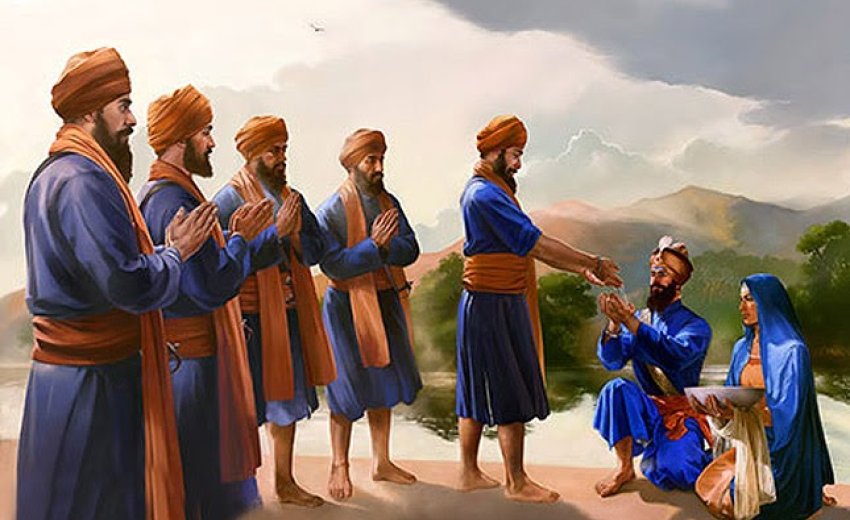In Sikhism, the Panj Piare stand as revered figures, etched in the hearts of the faithful. These five beloved ones are not merely figures from history; they embody the spirit of courage, devotion, and selflessness that define Sikh ideals. In 2021, the former Chief Minister of Uttrakhand, Harish Rawat compared the Punjab Congress chief Navjot Sidhu and his four advisors to Panj Piare. However, he later apologized for doing so. He also promised to do seva at a gurudwara as a gesture of respect.
Who are the Panj Piare?
'Panj Piare' is a group of five baptized people, which is part of a concept and tradition created by the 10th Sikh Guru, Gobind Singh Ji. On the day of Baisakhi in 1699, Guru Gobind Singh Ji established the institution of Panj Piare while founding the Khalsa. He spoke to a large crowd and asked for five volunteers to sacrifice themselves. Five men stepped forward and responded to his call. Guru Ji then baptized them and named them Panj Piare.Since that time,every group of five baptized Sikhs is referred to as Panj Piare and is given the same respect as the first five Sikhs.
Who were the first Panj Piare?
The Panj Piare, chosen by Guru Gobind Singh Ji, came from different castes and states in India. Bhai Daya Ram was from Lahore, Bhai Dharam Rai came from Hastinapur in Uttar Pradesh, Bhai Himmat Rai came from Jagannath in Odisha, Bhai Mohkam Rai came from Gujarat, and Bhai Sahib Chand was from Bidar, Karnataka.
To unite them and make them equal Guru Gobind Singh Ji made them all drink Amrit, which is sweet water prepared by reciting Gurbani, from the same utensil. He then added "Singh" to their names and gave them new names: Bhai Daya Singh, Bhai Dharam Singh, Bhai Himmat Singh, Bhai Mohkam Singh, and Bhai Sahib Singh.
Guru Gobind Singh Ji not only defined the religious and social protocol for the Khalsa through the Panj Piare, but he also himself received baptism from them. He wanted to emphasize that the Panj Piare have higher authority and decision-making power than anyone else in the Sikh community.
How did the Guru establish the authority of Panj Piare?
Once upon a time, Guru Gobind Singh and his Khalsa army were surrounded at Chamkaur by the combined forces of the Mughals and mountain kings. The Khalsa soldiers wanted Guru Gobind Singh to leave Chamkaur, but he refused.
However, the Panj Piare, a group of five beloved Sikhs, ordered the Guru to leave Chamkaur. As a Sikh, Guru Gobind Singh had a duty to follow their command, just like any other Sikh. So, he obeyed their orders.
This event is the reason why the Panj Piare are highly respected in Sikh history. They have made many important decisions throughout the Sikh community's journey.
Who can become a Panj Piara?
In Sikhism, any baptized Sikh has the opportunity to become a Panj Piare, which is a group of five beloved ones. When the Panj Piare reaches a unanimous decision, it becomes binding for everyone in the Sikh community. Similarly, the Akal Takht Jathedar, who holds an important position, cannot make decisions on their own. Any directive from the Akal Takht must be endorsed by all five Jathedars of the five Takhts or their representatives.
A significant controversy arose when the Panj Piare appointed by the SGPC (Shiromani Gurdwara Parbandhak Committee) summoned the then Akal Takht Jathedar, Giani Gurbachan Singh, regarding the matter of granting pardon to Gurmeet Ram Rahim, the leader of Dera Sacha Sauda, in 2015. This issue created a lot of debate and disagreement among the Sikh community.
The SGPC found itself in a difficult situation and used its authority to remove the Panj Piaras from their positions. However, the mishandling of this crisis by the SGPC reflected poorly on the Shiromani Akali Dal-Badal party. This incident added to the party's existing allegations of disrespecting Sikh institutions, traditions, and beliefs. As a result, the SAD only won 15 seats in the subsequent 2017 elections.
During the 2014 parliamentary elections, Bikram Singh Majithia, a Punjab cabinet minister at the time, campaigned for the Bhartiya Janta Party candidate Arun Jaitley. In one of his speeches in Amritsar, Majithia slightly altered lines from the Sikh holy text. This action angered the clergy, and Majithia had to apologize and faced the possibility of being 'excommunicated' from the Akal Takht, a significant Sikh religious institution.
There have been several incidents where even a small misinterpretation of sacred Sikh traditions and the holy text has caused controversy, often resulting in symbolic punishments by the clergy towards the wrongdoer. The Sikh clergy is extremely cautious about anyone undermining their traditions or the holy text in any manner. Therefore, even lighthearted comparisons are not taken kindly.
*Based on an article written by Kamaldeep Singh Brar, published in The Indian Express on 7th September 2021

